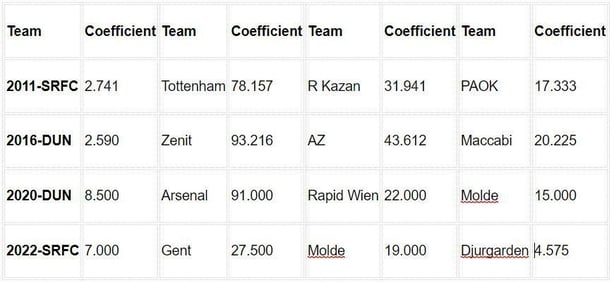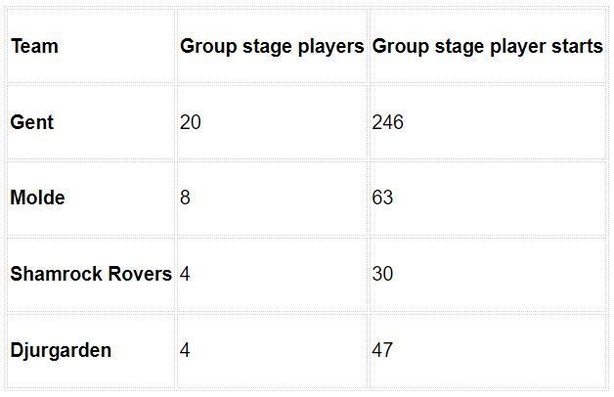"Soccer history"; "Cracked Irish football's glass ceiling"; "Incredible night".
"Successfully breezed through"; "Another great League of Ireland night"; "Group stages confirmed".
The tone of the headlines has simmered down a little since Shamrock Rovers' initial breakthrough to European group stage football in the 11 years since 2011. Then, Stephen O’Donnell’s winner felt akin to Neil Armstrong’s foot landing on the moon. The win in Macedonia seems a little more like Elon Musk sending tourists into space.
Some of the credit for this must be given to Irish clubs improved performance in Europe. As well as this Shamrock Rovers team, Dundalk achieved similar success twice in the last five years. More recently, Bohemians, Sligo Rovers and St. Pat’s have all beaten higher ranked opposition.
However, the introduction of the Europa Conference League, designed to give more teams the chance of group stage football, has increased opportunities for leagues like ours. When Shamrock Rovers entered the group stage in 2011, they did so as the lowest ranked team to advance that far. This time, they are ranked 22nd of the 32 in this competition.
Back then, 20 league champions made it to group stages of either the Champions or Europa League. This year there will be 35 across the three competitions.
How did they get here?
In their first tie of the year, at home to Hibernians of Malta, they scored more goals than in all their European ties, home or away, in the 1980s. That 3-0 win and a 3-1 win over Macedonia's Shkupi both came at home and they set up the two aggregate victories they had. Before this year, they had only scored three or more goals four times in 84 continental games.
Shamrock Rovers have advanced with a 100% home record which only Bodo Glimt and Lech Poznan share having played four qualification matches in Europe this year. Though neither has the away win the Hoops do. (Djurgarden have a 100% record but from three games).
How likely is that to continue when the class of opponent is raised? Last season, two teams similarly went through four qualifying rounds with all home wins, they were Malmo and Sheriff in the Champions League.
Malmo struggled with the step up just getting a draw from their game with Zenit St. Petersburg and losing to Chelsea and Juventus. Sheriff though, fared better gaining two wins from their subsequent four games in the group stages and Europa League play-off.
When Shamrock Rovers and Dundalk qualified for group stages in 2011 and 2016, they did so with a win, a loss and a defeat in their home qualifying rounds so Stephen Bradley’s side go in much better equipped to compete on home soil.

Given the nature of the Conference League, Shamrock Rovers were able to qualify without knocking out a higher seed as the three other Irish sides did and they will play considerably easier opposition than those teams. The best team they face, Gent, would have been bottom seeds in 2011 or 2016. As third seed themselves, there can be reasonable optimism that points can be taken from bottom-seeds Djurgarden.
Last year's Conference League group stage had 10 teams who made it having started in the first round of Champions League qualification. Just Bodo/Glimt from those made it to the knock-out round play-off after finishing second in their group despite having the second-lowest co-efficient of all 32 teams.
Key to their surprising success was the home form mentioned earlier, they won all three home games with a comfortable 11-2 aggregate and went on to win three more in the knock-out stages as far as the quarter-finals. They are currently on a 13 home win in Europe streak despite having just one away win in that time. Much can be achieved when your home is a genuine fortress.
In total from the eight groups, three teams who were seeded either third or fourth finished in the top two. Of those, both Bodo/Glimt and Randers had a lower co-efficient than what Shamrock Rovers bring with them while Vitesse had one only marginally better.
On paper, Shamrock Rovers should be relatively happy with their draw. Gent were the fifth-highest seed from pot one (though realistically less daunting opposition than last year’s semi-finalists West Ham), Molde are the second best ranked team from pot two though again seem like a preferable draw to Fiorentina or Koln while Djurgarden were fifth in the final pot and come in making their debut in a European group stage.
The seeds validity are shown in the squads each team possesses. Gent, having gone beyond group stages of all three competitions four times in the last seven years, have an abundance of players with experience of the group stages or beyond.
Molde, who have twice in their last five European participations made it from a group stage have a less intimidating profile while the 47 starts Djurgarden combine for largely come from Pierre Bengtsson’s 31.

This all points to the opening game when Shamrock Rovers face Djurgarden at Tallaght Stadium as providing the best probability of picking up a win. The Hoops go into the game with a two-day rest advantage and although the Swedes have won away twice in getting here, they had not won away in Europe before that since a 2004 win in Lithuania. That coming two years after their prior victory, against Shamrock Rovers.

How may this affect league form?
Shamrock Rovers go into group stage competition with a four-point lead at the top domestically. This gives keeps them looking over their shoulders at the ten-game unbeaten run of a charging Derry City.
In 2011, they were more fortunate in having just three games directly following a European game, this year all six will be followed by a domestic fixture in a few days (five league, one FAI Cup quarter-final). Then they were in a tight battle and were third on the day they kicked-off in the group stages. But they won two of three, helped by playing the eighth and ninth placed teams, on their way to the league title.
Dundalk were more impacted by balancing dual priorities. Across nine games in 2016 and 2020 they had the same number of wins, draws and losses - three. But they went into 2016 with a ten-point advantage and were out of title contention by that stage of the 2020 campaign.
Thus far in qualifying Shamrock Rovers have three wins and a pair of draws following European competition. They have done so by making quite a lot of changes to their team but keeping it within a condensed squad. Just 20 players have started a league game for them this year compared to 26 in 2011.
|
Rovers opponents |
Line-up changes | Result |
|
Drogheda United |
5 |
1-1 draw |
| Bangor | 9 | 4-0 victory |
| Derry City | 4 | 0-0 draw |
| Dundalk | 2 | 3-0 victory |
|
Drogheda United |
7 | 2-1 victory |
Where may they go from here?
Among the less positive headlines to follow the 2011 breakthrough, were concerns that the financial rewards earned by Shamrock Rovers would see them emulate a Rosenborg-type dominance and have most of the decade's league titles already won. However, group stage participation has proven to be more of a poison chalice.
The final group stage game, at home to Tottenham, would be the last for Michael O’Neill with the club and their success went with him. They would not win the league or cup for eight years and had no European win until 2015.
Although Dundalk kept Stephen Kenny for two more years, the 2017 season saw them finish runners-up and end their three years of dominance. 2021 would be disastrous for Dundalk in many respects as they finished in the bottom half of the table with Filippo Giovagnoli leaving early in the campaign.
One of the main reasons for not sustaining success has been squad turnover. Of the players to start for Shamrock Rovers in the 2011 group stages, 39% were no longer at the club when the next season began. Dundalk in 2016 did not lose many players but of those who started all group games, 42% immediately departed while in 2020 38% of all starters quickly found the exit.
Its impossible to say how much of the 2022 class for Shamrock Rovers will go elsewhere but given there has already been interest in Stephen Bradley’s services and Andy Lyons recently confirmed a transfer to Blackpool, there’s always going to be concern that the allure of playing at a higher level will win out.
Although group stage qualification, especially to the Europa Conference League for champions, may no longer only happen once in a blue moon, history suggests the success may be fleeting for certain teams so should be savoured. And with the incentive for Shamrock Rovers to get their first group stage point or win, to be the first Irish team to have an away win and be the first to finish better than fourth, there is plenty to compete for in the coming months.


